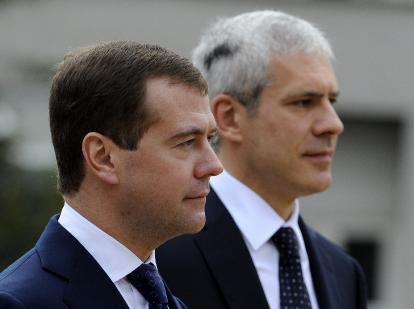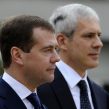
Medvedev Exploits Past-Oriented Nationalism in Belgrade
Publication: Eurasia Daily Monitor Volume: 6 Issue: 197
By:

A Russian military foothold in Serbia is potentially the most significant result of President Dmitry Medvedev’s October 20 visit to the country. This intention has greater chances of materializing, compared with the Serbian section of Gazprom’s South Stream project, an agreement on which was also signed during Medvedev’s visit. The Serbian government continues rewarding Russia’s support for Belgrade on Kosovo.
Russia’s Emergency Situations Minister Sergei Shoigu signed an agreement with Serbian Deputy Prime Minister and Internal Affairs Minister Ivica Dacic which has potential military implications. Signed in Medvedev’s and Serbian President Boris Tadic’s presence, the agreement envisages the establishment of a logistical center, labeled “humanitarian,” for response to natural and technological catastrophes. The center is to be located near the city of Nis in south-eastern Serbia. Both sides intend this logistical center to develop into a large operation that would serve the entire Balkan region for disaster prevention and response and the liquidation of disaster consequences (Interfax, October 20; B-92 TV, October 21).
It seems hard to imagine a European country agreeing to host Russian militarized fire-fighting, flood-response, or chemical-protection units on its national territory in anticipation of some catastrophes. Serbia’s bizarre agreement with Russia is the first of its kind. Russia’s Emergency Situations Ministry is a fully militarized ministry. This agreement opens the door for Russian uniformed personnel, helicopters, and dual-purpose supplies to be forward-deployed in Serbia on a long-term basis, using the airfield near Nis. This Russian logistical center looks like a symbolic response to the U.S. Camp Bondsteel on the opposite side of the border in Kosovo.
Nis is almost equally close to Serbia’s borders with Bulgaria and Kosovo respectively. It is situated near the northern end of the Presevo Valley, a tense Albanian-inhabited enclave on Serbia’s territory, adjacent to Kosovo. In a crisis situation, Russia might pose problems for Romania, Bulgaria, or some other country by requesting over flight permission in order to resupply or reinforce the Nis center. A situation of that type occurred in 1999 when Romania, Bulgaria, and Hungary –all confident of U.S. and NATO support– turned down Moscow’s request of over flight permission for Russian planes to resupply Serbia.
Medvedev’s visit occasioned an outpouring of gratitude in Belgrade for Russian support toward Serbia’s position on Kosovo and for its perceived economic support. Even a Europe-oriented figure such as President Tadic succumbed to the emotionally charged atmosphere. Failing to mention the European Union at all in his speech, Tadic hailed the “exceptional political understanding in practically all areas in which the Serbian state and the Russian state act,” and described Serbia’s participation in South Stream as “of essential importance [for] the development of the European continent.” He described the center in Nis, as being intended to combat “great catastrophes and disasters that are unfortunately weighing down mankind.” In addition, Tadic praised Medvedev’s European security proposals, as a source of “great pleasure” to Serbia and “of the highest importance to all peoples today,” and Russia’s power as “absolutely an unavoidable factor of international politics today, the biggest country on this planet of ours” (Serbian Radio and Television, October 20).
Judiciously timed to coincide with Medvedev’s visit, Serbian authorities discovered a document purportedly attesting to Russo-Serb relations in 1509. This convenient discovery enriched Medvedev’s visit with marking the 500th anniversary of bilateral relations. “Our relations were adorned by exceptional understanding throughout history, great support and solidarity in critical moments,” Tadic claimed.
Medvedev’s visit was billed as the first-ever by a Russian president on Serbian soil; and was timed to mark the anniversary of the Soviet Army’s entry into Belgrade on October 20, 1944. That was, however, a Yugoslav event, rather than Serbian, as it enabled Tito’s forces to crush the Serbian nationalists while establishing a Communist Yugoslavia. The Greater-Serbia ideology, later adopted by Slobodan Milosevic’s Yugoslav regime and defeated in the 1990’s, survives in a limited form through the goal of regaining Kosovo and potentially the Serb entity in Bosnia-Herzegovina. The Kremlin encourages Serbian ambitions in order to gain influence in Belgrade and establish a strategic position in the Balkans.
In Belgrade, Medvedev announced that Russia would continue and even redouble support for Serbia to “maintain its sovereignty and territorial integrity” with regard to Kosovo. Hinting at their tactical coordination, Medvedev encouraged Serbia to hold firmly, advance its proposals and count on Russian support. He warned “the protectors of Kosovo’s independence [i.e., the United States and the E.U. collectively] that, despite their efforts, they would not succeed in representing Kosovo’s independence as irreversible and the issue as resolved” (Interfax, Russian presidential website, October 20).
Medvedev also held a brief, semi-official meeting in Belgrade with the Bosnian Serb Republic’s Prime Minister Milorad Dodik. The Russian president encouraged the Bosnian Serb leaders to resist proposals that would strengthen the authority of Bosnia-Herzegovina’s central government in Sarajevo vis-à-vis that of the Serb Republic in Banja-Luka. Thus, Russia would support Serb Republic’s positions, withhold support from proposals that are not supported by Bosnian Serbs, and reject any U.S.- and E.U.- “imposed solutions” (Interfax, October 20; SRNA, October 21).
Moscow’s tactics are designed to prolong an ambiguous situation in Kosovo, set Belgrade at odds with the U.S. and E.U. on that issue, keep Bosnia-Herzegovina dysfunctional in order to stop its course toward the E.U. and NATO, and encourage Serbian past-oriented nationalism as a means for Russia –alongside its economic means– to compete against the West in the Balkans.




